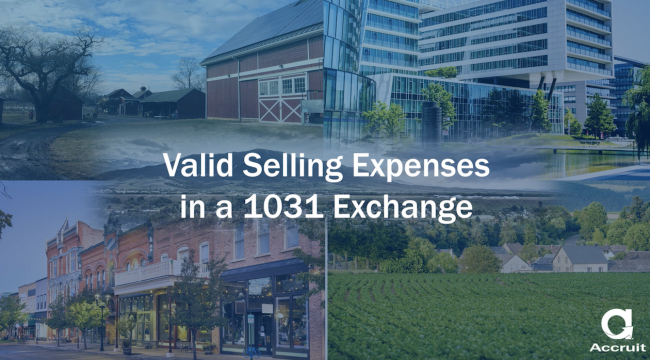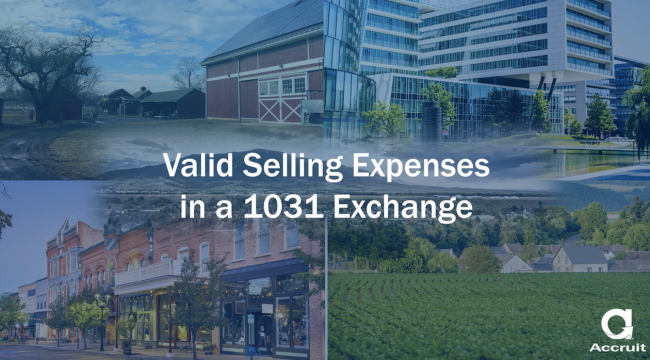Denver, CO, February 14, 2023 –Accruit Holdings, grew their team and expanded into three new states, Arizona, Michigan and Texas, with the addition of eight new team members in early 2023. The Business Development team welcomed Chassidy Goolsby, Aaron Shields, Dylan Johnson, Ronnie Sterling, and Dave Tornell. Jason Messmore and Brynn Hamilton joined the Service Development team. And Noah Doran will lead the Client Service team in a the newly created role of Client Service Manager.
Accruit’s Business Development team has undergone extensive growth with the addition of these five team members. With Dylan and Ronnie’s new, local presence in Michigan and Texas, respectively, Accruit will be able to provide in-market service and 1031 exchange education opportunities for exchangers and their advisors. Additional team members Aaron and Chassidy in Colorado and Dave in Arizona will focus on expanding the client base for offerings made possible by Accruit’s patented software Exchange Manager ProSM. “We have more than doubled the number of sales roles in our organization to engage the 1031 exchange market with a comprehensive solution for all participants – Exchangers, Advisors and Qualified Intermediaries. We filled these new roles with Real Estate industry experts to deliver outstanding service to our industry partners and individual investors alike. We are poised for a record-breaking year built on a foundation of 1031 expertise and operational excellence.,” stated Elliot Rutter, Director, Sales.
Since January 2022, Accruit’s Service Development team has doubled in size. Jason Messmore, Service Development Business Analyst, will serve in the key role of liaison between business stakeholders and the development team, collecting and writing requirements and performing critical user acceptance testing, while also serving as scrum master. Brynn Hamilton, joins Accruit as a Junior Software Developer. Her addition will provide the department much needed depth to Accruit’s Development team, increasing their ability to release more functionality for Exchange Manager ProSM users, while also providing support in the Eastern Time Zone.
“We are thrilled to have both Brynn and Jason on board and look forward to them quickly making key contributions as we continue to improve and enhance Exchange Manager ProSM, the only 1031 exchange workflow technology. Their additions give us much needed depth as we work to seamlessly scale our infrastructure to support our 1031 exchange software offerings,” said Mark Mayfield, Vice President, Service Development and Delivery.
Noah Doran joins the Client Service Department in the newly created position, Senior Manager, Client Service. Noah will be instrumental in continuing to organize and refine the structure and processes of our quickly growing Client Services team. “He will focus on maintaining our world class Customer Service scores, while ensuring that we can efficiently handle the exchanges being brought in by our expanded Business Development team,” said Mark.
“Accruit is excited to continue investing in the right people nationwide that support our long-term vision of revolutionizing the 1031 industry through world-class service and innovative technologies,” stated President and CEO Brent Abrahm.
Accruit Holdings
Accruit Holdings boasts over 20 years in the 1031 exchange industry. Through Accruit, their leading independent, national Qualified Intermediary, they provide 1031 exchange services across all 50 states and specialize in all types of exchanges from forward, reverse, built-to-suit/improvement to specialty “non-safe harbor” reverse exchanges. Accruit Technologies, a subsidiary focused on revolutionizing the industry through their patented 1031 exchange workflow software, offers both SaaS and back-office solutions to the real estate marketplace.
Blog
-

1031 Exchange Industry Leader, Accruit Holdings, Welcomes Eight New Team Members to Support Growth of Multiple Service Offerings
-

What is an Accredited Investor?
The Securities and Exchange Commission (SEC) was created after the 1929 financial crisis brought chaos to US investors. The commission’s primary goal is to protect unsophisticated investors from participating in investment opportunities that they might not understand or from taking on too much risk without adequate information. Accordingly, it created a category of investor referred to as accredited, which means the individual (or entity) is eligible to invest in a broader range of investment options than others. In order to be considered accredited, an investor must meet at least one of the following qualifications:
Have an annual income of over $200,000 ($300,000 with a partner) for at least two previous years and an expectation of the same for the current year.
Have a personal or joint net worth of over $1 million, excluding the value of the primary residence. For entities, the minimum net worth is $5 million.
Be an investment professional holding an appropriate license such as Series 7, Series 65, or Series 62.Investors who qualify by these criteria can be accredited for most restricted offerings. However, it’s important to note that the company or entity offering the investment decides which investors qualify. While these are among the common means of being accredited, the
-

What is an Accredited Investor?
The Securities and Exchange Commission (SEC) was created after the 1929 financial crisis brought chaos to US investors. The commission’s primary goal is to protect unsophisticated investors from participating in investment opportunities that they might not understand or from taking on too much risk without adequate information. Accordingly, it created a category of investor referred to as accredited, which means the individual (or entity) is eligible to invest in a broader range of investment options than others. In order to be considered accredited, an investor must meet at least one of the following qualifications:
Have an annual income of over $200,000 ($300,000 with a partner) for at least two previous years and an expectation of the same for the current year.
Have a personal or joint net worth of over $1 million, excluding the value of the primary residence. For entities, the minimum net worth is $5 million.
Be an investment professional holding an appropriate license such as Series 7, Series 65, or Series 62.Investors who qualify by these criteria can be accredited for most restricted offerings. However, it’s important to note that the company or entity offering the investment decides which investors qualify. While these are among the common means of being accredited, the
-

What is an Accredited Investor?
The Securities and Exchange Commission (SEC) was created after the 1929 financial crisis brought chaos to US investors. The commission’s primary goal is to protect unsophisticated investors from participating in investment opportunities that they might not understand or from taking on too much risk without adequate information. Accordingly, it created a category of investor referred to as accredited, which means the individual (or entity) is eligible to invest in a broader range of investment options than others. In order to be considered accredited, an investor must meet at least one of the following qualifications:
Have an annual income of over $200,000 ($300,000 with a partner) for at least two previous years and an expectation of the same for the current year.
Have a personal or joint net worth of over $1 million, excluding the value of the primary residence. For entities, the minimum net worth is $5 million.
Be an investment professional holding an appropriate license such as Series 7, Series 65, or Series 62.Investors who qualify by these criteria can be accredited for most restricted offerings. However, it’s important to note that the company or entity offering the investment decides which investors qualify. While these are among the common means of being accredited, the
-

Video: What are Valid Selling Expenses in a 1031 Exchange?
In a 1031 Exchange, if certain expenses associated with the selling or purchasing of property are paid with the exchange funds it will create a taxable event. However, there are certain selling expenses that can be paid with exchange funds without creating a tax liability, learn what those specific expenses are within this video.
-

Video: What are Valid Selling Expenses in a 1031 Exchange?
In a 1031 Exchange, if certain expenses associated with the selling or purchasing of property are paid with the exchange funds it will create a taxable event. However, there are certain selling expenses that can be paid with exchange funds without creating a tax liability, learn what those specific expenses are within this video.
-

Video: What are Valid Selling Expenses in a 1031 Exchange?
In a 1031 Exchange, if certain expenses associated with the selling or purchasing of property are paid with the exchange funds it will create a taxable event. However, there are certain selling expenses that can be paid with exchange funds without creating a tax liability, learn what those specific expenses are within this video.
-

What is a Passive Investment?
The idea of passive income is prevalent—which is logical since the term refers to earning money without actually doing anything. That sounds too good to be true, and it is, but some income-producing activities require more involvement than others. For example, working at a job is one way to earn active income. On the other hand, investing can be either DSTs are legal entities structured under Delaware laws that allow investors to participate in the ownership of commercial property as a beneficiary of the trust with a proportional share of the potential earnings. A Sponsor creates the trust, identifies and acquires the assets, and distributes profits. However, due to the lack of liquidity and other risks, DST participation is open only to accredited investors.
Any investor can invest in a Real Estate Investment Trust (REIT). Realized to learn more about their due diligence and portfolio construction methodologies.
This material is for general information and educational purposes only. Information is based on data gathered from what we believe are reliable sources. It is not guaranteed as to accuracy, does not purport to be complete and is not intended to be used as a primary basis for investment decisions. It should also not be construed as advice meeting the particular investment needs of any investor.
Realized does not provide tax or legal advice. This material is not a substitute for seeking the advice of a qualified professional for your individual situation.
All real estate investments have the potential to lose value during the life of the investment. All financed real estate investments have the potential for foreclosure.
All investments have an inherent level of risk. The value of your investment will fluctuate with the value of the underlying investments. You could receive back less than you initially invested and there is no guarantee that you will receive any income.
Programs that depend on tenants for their revenue may suffer adverse consequences because of any financial difficulties, bankruptcy or insolvency of their tenants.
No public market for DSTs currently exists, and one may never exist. DST programs are speculative and suitable only for Accredited Investors who do not anticipate a need for liquidity or can afford to lose their entire investment.
There is no guarantee that the investment objectives of any program will be achieved.
The actual amount and timing of distributions paid by REIT programs is not guaranteed and may vary. There is no guarantee that investors will receive distributions or a return of their capital. These programs can give no assurance that it will be able to pay or maintain distributions, or that distributions will increase over time.
Hypothetical examples shown are for illustrative purposes only.
A REIT is a security that sells like a stock on the major exchanges and invests in real estate directly, either through properties or mortgages.
REITs receive special tax considerations and typically offer investors high yields, as well as a highly liquid method of investing in real estate.
There are risks associated with these types of investments and include but are not limited to the following:Typically, no secondary market exists for the security listed above.
Potential difficulty discerning between routine interest payments and principal repayment.
Redemption price of a REIT may be worth more or less than the original price paid.
Value of the shares in the trust will fluctuate with the portfolio of underlying real estate.
There is no guarantee you will receive any income.
Involves risks such as refinancing in the real estate industry, interest rates, availability of mortgage funds, operating expenses, cost of insurance, lease terminations, potential economic and regulatory changes.This is neither an offer to sell nor a solicitation or an offer to buy the securities described herein. The offering is made only by the Prospectus.
-

What is a Passive Investment?
The idea of passive income is prevalent—which is logical since the term refers to earning money without actually doing anything. That sounds too good to be true, and it is, but some income-producing activities require more involvement than others. For example, working at a job is one way to earn active income. On the other hand, investing can be either DSTs are legal entities structured under Delaware laws that allow investors to participate in the ownership of commercial property as a beneficiary of the trust with a proportional share of the potential earnings. A Sponsor creates the trust, identifies and acquires the assets, and distributes profits. However, due to the lack of liquidity and other risks, DST participation is open only to accredited investors.
Any investor can invest in a Real Estate Investment Trust (REIT). Realized to learn more about their due diligence and portfolio construction methodologies.
This material is for general information and educational purposes only. Information is based on data gathered from what we believe are reliable sources. It is not guaranteed as to accuracy, does not purport to be complete and is not intended to be used as a primary basis for investment decisions. It should also not be construed as advice meeting the particular investment needs of any investor.
Realized does not provide tax or legal advice. This material is not a substitute for seeking the advice of a qualified professional for your individual situation.
All real estate investments have the potential to lose value during the life of the investment. All financed real estate investments have the potential for foreclosure.
All investments have an inherent level of risk. The value of your investment will fluctuate with the value of the underlying investments. You could receive back less than you initially invested and there is no guarantee that you will receive any income.
Programs that depend on tenants for their revenue may suffer adverse consequences because of any financial difficulties, bankruptcy or insolvency of their tenants.
No public market for DSTs currently exists, and one may never exist. DST programs are speculative and suitable only for Accredited Investors who do not anticipate a need for liquidity or can afford to lose their entire investment.
There is no guarantee that the investment objectives of any program will be achieved.
The actual amount and timing of distributions paid by REIT programs is not guaranteed and may vary. There is no guarantee that investors will receive distributions or a return of their capital. These programs can give no assurance that it will be able to pay or maintain distributions, or that distributions will increase over time.
Hypothetical examples shown are for illustrative purposes only.
A REIT is a security that sells like a stock on the major exchanges and invests in real estate directly, either through properties or mortgages.
REITs receive special tax considerations and typically offer investors high yields, as well as a highly liquid method of investing in real estate.
There are risks associated with these types of investments and include but are not limited to the following:Typically, no secondary market exists for the security listed above.
Potential difficulty discerning between routine interest payments and principal repayment.
Redemption price of a REIT may be worth more or less than the original price paid.
Value of the shares in the trust will fluctuate with the portfolio of underlying real estate.
There is no guarantee you will receive any income.
Involves risks such as refinancing in the real estate industry, interest rates, availability of mortgage funds, operating expenses, cost of insurance, lease terminations, potential economic and regulatory changes.This is neither an offer to sell nor a solicitation or an offer to buy the securities described herein. The offering is made only by the Prospectus.
-

What is a Passive Investment?
The idea of passive income is prevalent—which is logical since the term refers to earning money without actually doing anything. That sounds too good to be true, and it is, but some income-producing activities require more involvement than others. For example, working at a job is one way to earn active income. On the other hand, investing can be either DSTs are legal entities structured under Delaware laws that allow investors to participate in the ownership of commercial property as a beneficiary of the trust with a proportional share of the potential earnings. A Sponsor creates the trust, identifies and acquires the assets, and distributes profits. However, due to the lack of liquidity and other risks, DST participation is open only to accredited investors.
Any investor can invest in a Real Estate Investment Trust (REIT). Realized to learn more about their due diligence and portfolio construction methodologies.
This material is for general information and educational purposes only. Information is based on data gathered from what we believe are reliable sources. It is not guaranteed as to accuracy, does not purport to be complete and is not intended to be used as a primary basis for investment decisions. It should also not be construed as advice meeting the particular investment needs of any investor.
Realized does not provide tax or legal advice. This material is not a substitute for seeking the advice of a qualified professional for your individual situation.
All real estate investments have the potential to lose value during the life of the investment. All financed real estate investments have the potential for foreclosure.
All investments have an inherent level of risk. The value of your investment will fluctuate with the value of the underlying investments. You could receive back less than you initially invested and there is no guarantee that you will receive any income.
Programs that depend on tenants for their revenue may suffer adverse consequences because of any financial difficulties, bankruptcy or insolvency of their tenants.
No public market for DSTs currently exists, and one may never exist. DST programs are speculative and suitable only for Accredited Investors who do not anticipate a need for liquidity or can afford to lose their entire investment.
There is no guarantee that the investment objectives of any program will be achieved.
The actual amount and timing of distributions paid by REIT programs is not guaranteed and may vary. There is no guarantee that investors will receive distributions or a return of their capital. These programs can give no assurance that it will be able to pay or maintain distributions, or that distributions will increase over time.
Hypothetical examples shown are for illustrative purposes only.
A REIT is a security that sells like a stock on the major exchanges and invests in real estate directly, either through properties or mortgages.
REITs receive special tax considerations and typically offer investors high yields, as well as a highly liquid method of investing in real estate.
There are risks associated with these types of investments and include but are not limited to the following:Typically, no secondary market exists for the security listed above.
Potential difficulty discerning between routine interest payments and principal repayment.
Redemption price of a REIT may be worth more or less than the original price paid.
Value of the shares in the trust will fluctuate with the portfolio of underlying real estate.
There is no guarantee you will receive any income.
Involves risks such as refinancing in the real estate industry, interest rates, availability of mortgage funds, operating expenses, cost of insurance, lease terminations, potential economic and regulatory changes.This is neither an offer to sell nor a solicitation or an offer to buy the securities described herein. The offering is made only by the Prospectus.